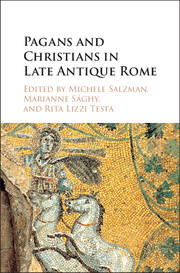 Pagans and Christians in Late Antique Rome
Pagans and Christians in Late Antique Rome from Part I - SENATORIAL POLITICS AND RELIGIOUS CONFLICT
Published online by Cambridge University Press: 05 November 2015
The controversy surrounding the removal and attempted restoration of the altar of Victory to the Curia in Rome is one of the most notorious episodes in late Roman history. It has customarily been treated as a defining moment in a longer conflict between paganism and Christianity, symbolized by a dramatic “debate” in 384 CE between the pagan prefect of Rome, Q. Aurelius Symmachus, and bishop Ambrose of Milan. Sourcebooks have contributed to this impression by (understandably) continuing to print the texts of Symmachus and Ambrose together. Only recently have scholars recognized that framing the issue in this way reproduces the perspective imposed on it by Ambrose himself, who purposefully published a copy of Symmachus's Third Relatio in his own collection of letters, “disadvantageously sandwiched” between his rebuttals. Ambrose's misleading presentation of the “debate” was quickly taken up and elaborated by his admirers, notably Prudentius in his poem Against Symmachus and Paulinus of Milan in his biography of Ambrose.
In contrast to the focus on the protagonists Symmachus and Ambrose, the role of Damasus in the affair has received much less attention; this, too, reflects Ambrose's presentation of the episode, for he accorded Damasus only a passing mention in his first letter to Valentinian II. A deeper investigation of Damasus's actions in the controversy, however, reveals an inconsistency in the Roman bishop's response to the Senate's attempts to restore the altar to its traditional place in the Curia. This chapter argues that the apparent inconsistency in Damasus's approach should be seen in the context of conflict not between pagans and Christians, but within the Christian community of Rome. While there is ample evidence for intra-Christian conflict during Damasus's episcopate, stemming initially from his contested election as bishop in 366 and subsequently from heated doctrinal debates over marriage and celibacy in the Roman Church, the dispute surrounding the altar has not figured in discussions of intra-Christian conflict at Rome. This chapter proposes to revisit the familiar problem of the altar by situating it in the context of ongoing intra-Christian strife; it argues that Damasus's actions in the affair were conditioned by his need to respond to internal challenges from schismatic rivals who threatened his position as leader of the Roman Church.
To save this book to your Kindle, first ensure no-reply@cambridge.org is added to your Approved Personal Document E-mail List under your Personal Document Settings on the Manage Your Content and Devices page of your Amazon account. Then enter the ‘name’ part of your Kindle email address below. Find out more about saving to your Kindle.
Note you can select to save to either the @free.kindle.com or @kindle.com variations. ‘@free.kindle.com’ emails are free but can only be saved to your device when it is connected to wi-fi. ‘@kindle.com’ emails can be delivered even when you are not connected to wi-fi, but note that service fees apply.
Find out more about the Kindle Personal Document Service.
To save content items to your account, please confirm that you agree to abide by our usage policies. If this is the first time you use this feature, you will be asked to authorise Cambridge Core to connect with your account. Find out more about saving content to Dropbox.
To save content items to your account, please confirm that you agree to abide by our usage policies. If this is the first time you use this feature, you will be asked to authorise Cambridge Core to connect with your account. Find out more about saving content to Google Drive.